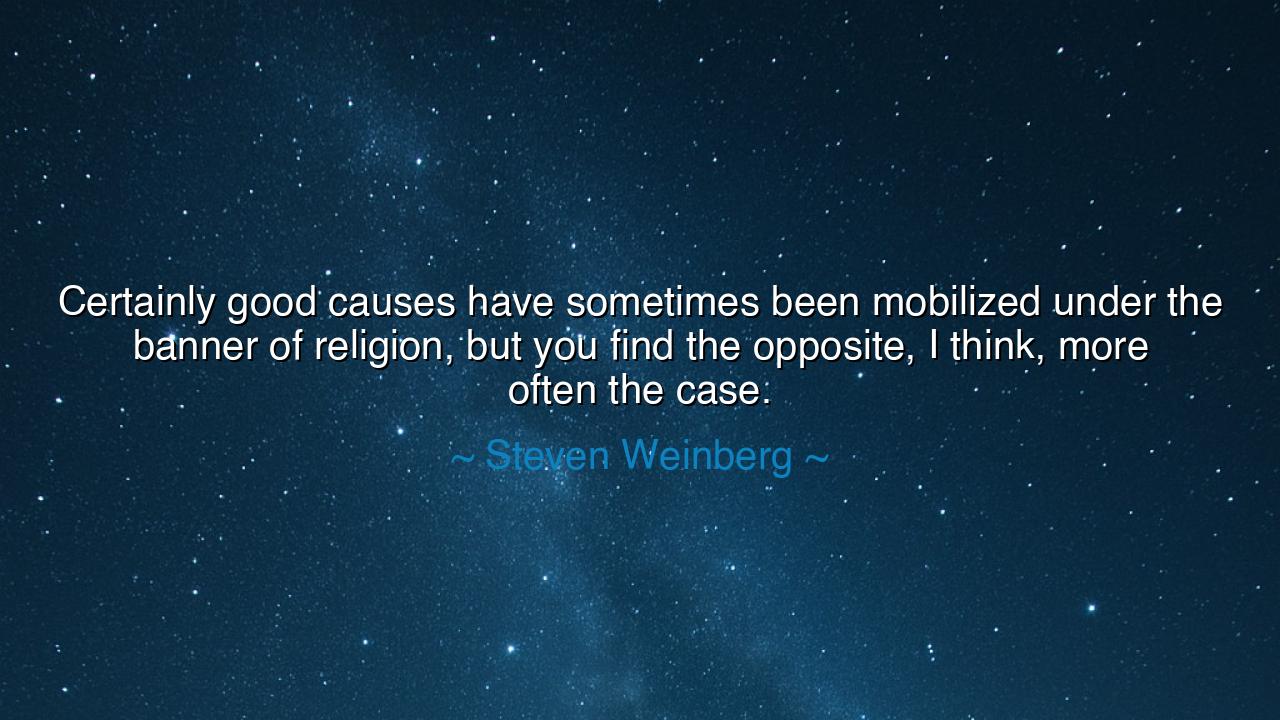
Certainly good causes have sometimes been mobilized under the
Certainly good causes have sometimes been mobilized under the banner of religion, but you find the opposite, I think, more often the case.






Steven Weinberg, seeker of truth in the stars, spoke with sobering clarity when he declared: “Certainly good causes have sometimes been mobilized under the banner of religion, but you find the opposite, I think, more often the case.” In these words lies the weight of history, the shadow of both triumph and tragedy. Religion, which has lifted the hearts of men to acts of mercy and courage, has also been wielded as a sword, justifying cruelty, conquest, and oppression. Weinberg’s wisdom is not a denial of the good, but a reminder of how often the banner of faith has been stained with the blood of contradiction.
The ancients themselves knew this peril. Among the Greeks, wars were often declared in the name of the gods, each city invoking its patron deity to sanctify its cause. Among the Hebrews, prophets thundered against their own people for corrupting the temple with injustice while crying “Thus says the Lord!” The danger was always the same: the holy flame, meant to warm and guide, was used instead to scorch and dominate. Weinberg’s words echo this warning—beware when causes march under the banner of religion, for they may cloak ambition, greed, or hatred in garments of sanctity.
Consider the Crusades, launched in the Middle Ages. Thousands took up the cross, believing they were serving God by seizing Jerusalem. And yet, beneath the holy cry, kings sought power, knights sought plunder, and blood was spilled in rivers. To the common soldier, it was a holy mission; to many of their leaders, it was conquest masked as faith. Even in victory, the banner of religion was tattered by the misuse of sacred words to justify unsacred deeds.
And yet, Weinberg acknowledges that there have been moments when good causes did arise under that same banner. The abolitionists of the 18th and 19th centuries, many driven by their faith, cried out that slavery was a sin before God. Leaders like William Wilberforce in Britain and Harriet Beecher Stowe in America invoked religion to awaken consciences and break chains. Here, at last, the banner of religion rallied not to destroy, but to liberate. Thus the paradox: religion is a double-edged sword, its power to inspire unmatched, yet its danger of corruption ever near.
The wisdom for us is this: do not judge an action righteous merely because it is done under the name of God. Ask instead: does it bring life or death, freedom or bondage, compassion or cruelty? The opposite of good is often cloaked in the garments of piety, and the discerning soul must look beyond the banner to the fruit. A cause that demands love and justice may be holy; a cause that breeds hatred and domination is idolatry, no matter how many prayers are spoken over it.
The lesson is plain: test every banner. Whether raised in religion, politics, or ideology, do not follow blindly. Weigh it against the eternal truths of mercy, justice, and humility. If it aligns with these, then join with courage; if it departs from them, resist, no matter how loudly it proclaims the name of God. For the divine is not deceived by banners, but by deeds, and history will remember not the slogans we marched under, but the lives we built or destroyed.
Practical actions follow. When you see causes proclaimed in the name of faith, pause and ask: Whom does this serve? Who gains, and who suffers? Does this call me to love my neighbor, or to despise him? Live so that your own faith, whatever it may be, becomes a light of compassion, not a weapon of domination. And when leaders call you to arms under sacred words, remember Weinberg’s warning—sometimes the greatest evil wears the holiest mask.
O seeker, take this to heart: religion is a banner, but the wind that fills it may be pure or foul. It can lead armies to slaughter, or it can free the oppressed. The difference lies not in the banner itself, but in the hearts of those who bear it. Therefore, let your heart be weighed with mercy, your cause be tested by justice, and your banner be raised only for love. For in this way, you will not be deceived by the mask of holiness, but will walk in the truth that endures beyond banners and beyond time.






AAdministratorAdministrator
Welcome, honored guests. Please leave a comment, we will respond soon